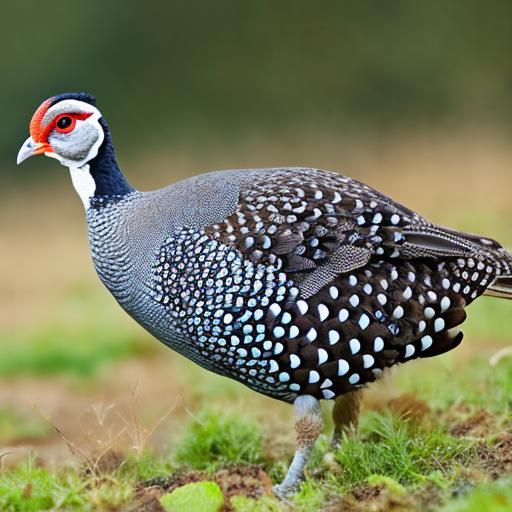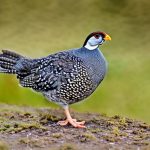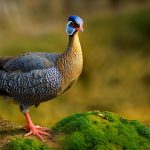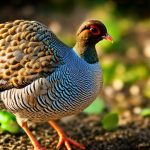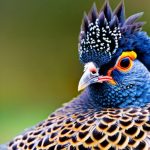Keeping guinea fowl can be a rewarding and enjoyable experience for anyone interested in raising poultry. These unique birds are known for their distinctive appearance, loud calls, and excellent pest control abilities. Guinea fowl are native to Africa and have been domesticated for thousands of years, making them well-suited to a variety of climates and environments. Whether you are a small-scale hobbyist or a commercial farmer, guinea fowl can be a valuable addition to your flock.
Guinea fowl are often kept for their pest control abilities, as they are voracious eaters of insects, ticks, and other pests. They are also known for their alert and vocal nature, making them excellent watchdogs for your property. Additionally, guinea fowl are relatively low-maintenance birds, requiring minimal care compared to other poultry species. However, they do have specific housing, nutritional, and social needs that must be met in order to ensure their health and well-being. In this article, we will explore the various aspects of keeping guinea fowl, including choosing the right enclosure, providing proper nutrition and water, protecting them from predators, managing their health and welfare, understanding their behavior and social needs, and integrating them into your property and daily routine.
Key Takeaways
- Guinea fowl are low-maintenance birds that can be a valuable addition to a homestead or farm.
- When choosing an enclosure for guinea fowl, consider their need for space, protection from predators, and access to shelter.
- Guinea fowl require a balanced diet of high-quality feed, fresh water, and access to foraging opportunities.
- Protect guinea fowl from predators by securing their enclosure, using guard animals, and providing safe roosting areas.
- Regularly monitor the health and welfare of guinea fowl, provide veterinary care when needed, and ensure they have a clean and comfortable living environment.
Choosing the Right Enclosure for Guinea Fowl
When it comes to housing guinea fowl, it is important to provide them with a secure and spacious enclosure that meets their specific needs. Guinea fowl are highly active birds that require plenty of space to roam and forage. A good rule of thumb is to provide at least 3-4 square feet of space per bird in the coop, and even more space in the outdoor run area. The coop should be well-ventilated and provide protection from the elements, with roosting bars for the birds to perch on at night.
In addition to the coop, guinea fowl also need access to a secure outdoor run or pasture area where they can forage for insects and other natural foods. This outdoor space should be enclosed with high fencing to prevent the birds from wandering off and to protect them from predators. Guinea fowl are excellent flyers and can easily escape from low fences, so it is important to have a secure enclosure that is at least 6 feet high. Providing plenty of natural vegetation, hiding spots, and dust bathing areas in the outdoor run will help keep the birds entertained and stimulated. Overall, the key to choosing the right enclosure for guinea fowl is to prioritize space, security, and environmental enrichment.
Providing Proper Nutrition and Water for Guinea Fowl
Proper nutrition is essential for the health and well-being of guinea fowl. These birds are omnivorous and have a varied diet that includes seeds, grains, insects, and vegetation. A good quality game bird feed can serve as the foundation of their diet, providing essential nutrients and protein. In addition to commercial feed, guinea fowl should have access to a diverse range of natural foods such as grass, weeds, fruits, and vegetables. They are excellent foragers and will eagerly consume insects, grubs, and other small creatures they find in their environment.
It is important to provide fresh, clean water at all times for guinea fowl. They should have access to water both in their coop and in their outdoor run area. In hot weather, it is especially important to ensure that the birds have access to plenty of water to prevent dehydration. Additionally, providing a shallow dish or container of water for the birds to bathe in is beneficial for their hygiene and overall health. Overall, providing proper nutrition and water for guinea fowl involves offering a balanced diet of commercial feed and natural foods, as well as ensuring access to clean water at all times.
Protecting Guinea Fowl from Predators
Guinea fowl are natural prey animals and are vulnerable to a wide range of predators including foxes, raccoons, hawks, owls, and even domestic dogs. It is essential to take proactive measures to protect guinea fowl from predators in order to ensure their safety and well-being. One of the most effective ways to protect guinea fowl from predators is to provide them with a secure enclosure that is predator-proof. This includes using sturdy fencing with no gaps or weak points that predators could exploit.
In addition to secure fencing, it is important to provide guinea fowl with a safe shelter within their coop where they can roost at night and seek refuge from predators. This shelter should have solid walls and a secure door that can be closed at night to keep predators out. Using motion-activated lights or sound devices near the coop can also help deter nocturnal predators. Another important aspect of protecting guinea fowl from predators is being vigilant and observant of any potential threats in the surrounding environment. Regularly inspecting the enclosure for signs of damage or intrusion by predators can help prevent attacks on the birds. Overall, protecting guinea fowl from predators requires a combination of secure housing, proactive measures, and vigilance.
Managing Guinea Fowl Health and Welfare
Managing the health and welfare of guinea fowl is essential for ensuring their long-term well-being and productivity. Like all poultry species, guinea fowl are susceptible to a range of health issues including parasites, respiratory diseases, and nutritional deficiencies. Regular health checks and observation of the birds’ behavior can help identify any potential health problems early on. Providing a clean and dry living environment is also important for preventing common health issues such as respiratory infections and foot problems.
In addition to physical health, it is important to consider the welfare of guinea fowl in terms of their mental and emotional well-being. Guinea fowl are social animals that thrive in the company of their own kind. Providing them with plenty of space to roam and forage, as well as opportunities for social interaction within their flock, can help promote their overall welfare. Environmental enrichment such as perches, dust bathing areas, and natural vegetation can also help keep guinea fowl mentally stimulated and content. Overall, managing the health and welfare of guinea fowl involves regular health checks, providing a clean living environment, and promoting their mental and emotional well-being through social interaction and environmental enrichment.
Understanding Guinea Fowl Behavior and Social Needs

Guinea fowl are highly social birds that thrive in the company of their own kind. They have a complex social structure within their flock, with established hierarchies and communication systems. Understanding guinea fowl behavior and social needs is essential for providing them with an environment where they can thrive. These birds are known for their alert and vocal nature, often sounding loud alarm calls when they perceive a threat or danger in their environment.
In addition to their vocalizations, guinea fowl also communicate through body language such as head bobbing, wing flicking, and tail wagging. Observing these behaviors can provide valuable insights into the birds’ social dynamics and overall well-being. Providing guinea fowl with plenty of space to roam and forage is important for promoting their natural behaviors and social interactions within the flock. Additionally, ensuring that they have access to a diverse range of natural foods and environmental enrichment can help keep them mentally stimulated and content. Overall, understanding guinea fowl behavior and social needs involves observing their communication signals, providing opportunities for social interaction within the flock, and promoting their natural behaviors through environmental enrichment.
Integrating Guinea Fowl into Your Property and Daily Routine
Integrating guinea fowl into your property and daily routine requires careful planning and consideration of their specific needs. These birds are highly active and independent creatures that require plenty of space to roam and forage. Before introducing guinea fowl to your property, it is important to ensure that you have a secure enclosure that meets their housing requirements. This includes providing a well-ventilated coop with roosting bars, as well as a secure outdoor run area enclosed with high fencing.
Once you have established a suitable enclosure for your guinea fowl, it is important to consider how they will fit into your daily routine. Guinea fowl are relatively low-maintenance birds compared to other poultry species, but they still require regular care and attention. This includes providing them with fresh water and food daily, as well as monitoring their health and well-being on a regular basis. Additionally, integrating guinea fowl into your property may involve making adjustments to accommodate their natural behaviors such as foraging and dust bathing. Overall, integrating guinea fowl into your property and daily routine involves careful planning of their housing needs and making adjustments to accommodate their natural behaviors within your daily schedule.
In conclusion, keeping guinea fowl can be a rewarding experience for anyone interested in raising poultry. These unique birds are known for their pest control abilities, alert nature, and low-maintenance care requirements. However, they do have specific housing, nutritional, social, and behavioral needs that must be met in order to ensure their health and well-being. By choosing the right enclosure, providing proper nutrition and water, protecting them from predators, managing their health and welfare, understanding their behavior and social needs, and integrating them into your property and daily routine, you can create an environment where guinea fowl can thrive and flourish.
If you’re considering keeping guinea fowl on your property, you may also be interested in learning about the best way to care for goslings. Check out this informative article on how to care for goslings to ensure that you have all the knowledge you need to successfully raise and nurture these adorable young geese.
FAQs
What are guinea fowl?
Guinea fowl are a type of bird native to Africa. They are known for their distinctive spotted feathers and loud, chattering calls.
Why would someone want to keep guinea fowl on their property?
Guinea fowl are often kept on properties for their pest control abilities. They are known to eat insects, ticks, and small rodents, making them valuable for keeping a property free of pests.
How do you keep guinea fowl on your property?
To keep guinea fowl on your property, you will need to provide them with a secure and spacious coop or shelter, access to fresh water and food, and protection from predators. It’s also important to provide them with enough space to roam and forage.
What do guinea fowl eat?
Guinea fowl are omnivores and will eat a variety of foods including insects, seeds, grains, and small rodents. It’s important to provide them with a balanced diet to keep them healthy.
Are guinea fowl noisy?
Yes, guinea fowl are known for their loud calls and can be quite noisy, especially when they feel threatened or are disturbed. It’s important to consider the noise factor when keeping guinea fowl on your property.
Do guinea fowl need to be kept in a flock?
Guinea fowl are social birds and do best when kept in a flock. They are known to form strong bonds with their flock mates and may become stressed or anxious if kept alone.
Are guinea fowl good for pest control?
Yes, guinea fowl are excellent for pest control. They are known to eat a variety of pests including insects, ticks, and small rodents, making them valuable for keeping a property free of pests.
Meet Walter, the feathered-friend fanatic of Florida! Nestled in the sunshine state, Walter struts through life with his feathered companions, clucking his way to happiness. With a coop that’s fancier than a five-star hotel, he’s the Don Juan of the chicken world. When he’s not teaching his hens to do the cha-cha, you’ll find him in a heated debate with his prized rooster, Sir Clucks-a-Lot. Walter’s poultry passion is no yolk; he’s the sunny-side-up guy you never knew you needed in your flock of friends!

